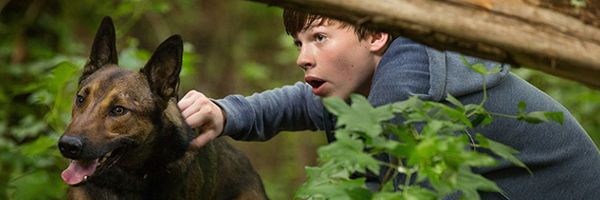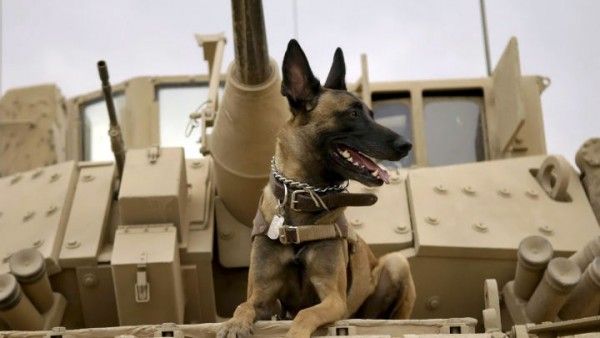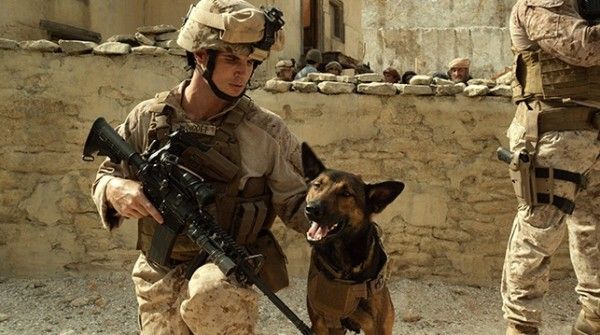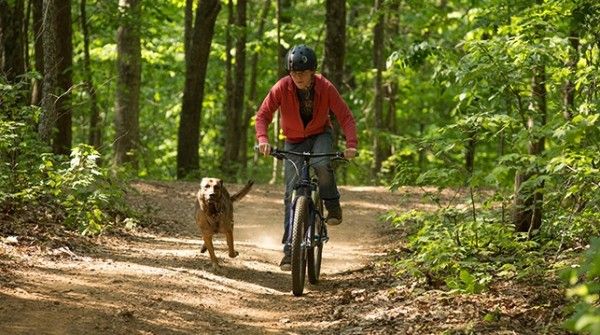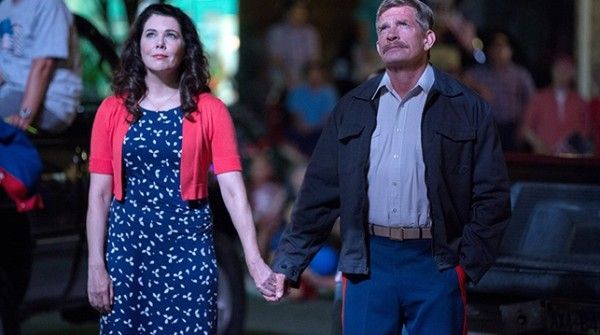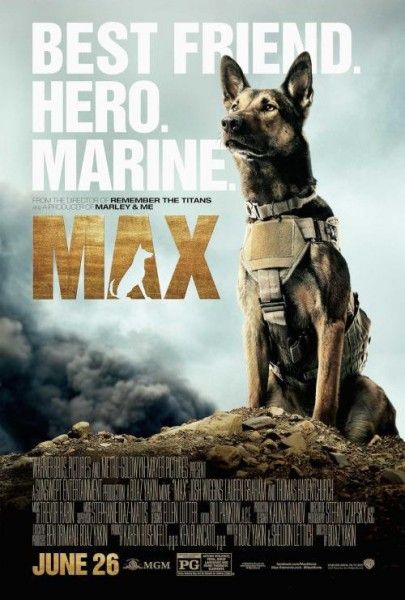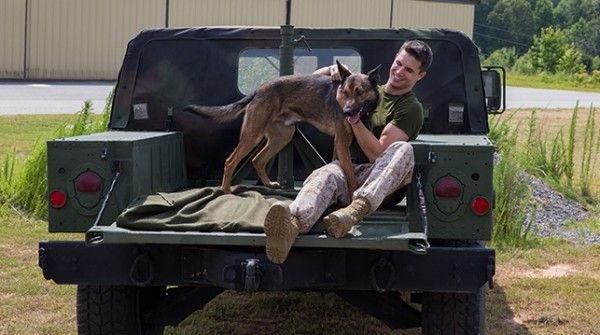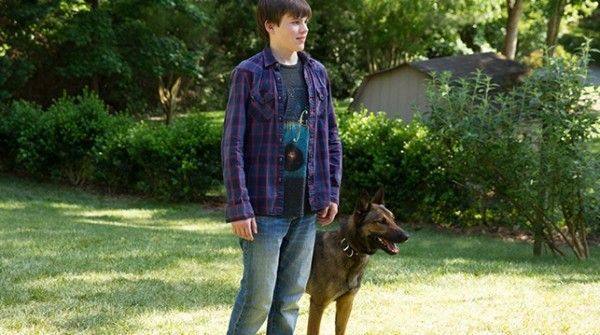In theaters today is Max, a family-friendly adventure film about a retired military dog struggling to adjust to civilian life after the death of his Marine owner. The film picks up in the frontlines of Afghanistan, where Kyle Wincott (Robbie Amell) is in the thick of battle with his trusty service dog Max ever by his side. When Kyle is tragically struck down in an explosion, Max is traumatized, unable to serve, and sent back to the United States. He's only willing to connect with Kyle's brother Justin (Josh Wiggins), and together, the duo help each other recover from their grief while setting off on an unexpected adventure.
I recently hopped on the phone for an exclusive interview with writer-director Boaz Yakin. We talked about...well, mostly dogs, but also about why it isn't so hard to work with animals after all, how Max has unexpected roots in The Hills Have Eyes, balancing the heavy moments with feel-good adventure, pushing the limits of the PG rating, his eclectic resume, and a lot more. Check out the full interview below.
So, you're a dog person, but are you also kind of a masochist? Because the one thing they always say is that working with animals is impossible and here you are doing a movie where the dog's in nearly every scene.
BOAZ YAKIN: In all seriousness, that whole "don't work with kids or animals" thing, it's such a myth in the sense of - if you ever tried working with an adult actor, you're grateful for every minute that you have working with a kid and with an animal. Young people, kids, who are talented and motivated, are fantastic to work with because they don't bring the baggage with them that they end up developing later in their lives. The truth is, in terms of working with animals, you really, as a director, you're interfacing with the trainers, much more than with the animals. The trainers have become so talented.
We worked with a guy and his company, a guy called Mark Forbes, has a company called 'Birds and Animals' and they do a lot of the stuff that you see in movies and television shows. And so smart, so gentle, so prepared, so good at what they do that it's actually not that difficult. Yes, when you're on a very difficult schedule and you have to hurry, hurry, hurry, sometimes a dog isn't doing exactly what you want it to do at the time that it's supposed to do it. But overall, it's no more difficult than camera equipment that isn't working, lighting that isn't going your way. It's really not that hard. The whole filmmaking process is incredibly challenging. But I wouldn't say that animals are more challenging than the rest.
Right. If the military trusts them in war, we can probably trust them to act for us.
YAKIN: Yeah, and it's not really acting. It's behavior. It's learned behaviors. For filmmakers that's a challenge because you're making a movie that's based on emotion, and that has to have scenes in it that evoke emotion. You're working in this very technical way and kind of hoping that the preparation that you've done and that the way you're doing it is going to come together in the editing room later in a way that it's going to all seamlessly feel real. That was the challenge more than anything else.
I'm curious, if you look back at your resume, you have this track record that defies characterization with the films that you've written and directed. They're in all kinds of genres. For this one, what was the appeal for you? Did you want to do a military story? Was it your love of animals?
YAKIN: Well, I think it's the second. I have this idea, my resume's weird because I never end up really making movies I'm trying to do and eventually settle on something that makes sense at the time that I'm making it. You know what I mean?
Yeah, for sure.
YAKIN: It's never as I plan it, for better or worse. But Max started out with me just thinking, "You know, it's been a really long" - I love dogs, I love animals, I love the connection that we have with animals and I really respect it. I was just like, "It's been a really long time since anyone's made an adventure film, a genuine adventure film with a dog or an animal that doesn't anamorphize the animal, that doesn't treat it in a cute, cloying manner."
I threw that at my friend, Sheldon [Lettich], who is a Marine and a Vietnam vet, just as something interesting to think about, and he came back to me with the idea of making it about a military working dog. That seemed to tick something off and we developed it from there. The project became what it is through the process. It's not like it was a big plan to make it that way. If anything, it evolved into more of a family drama, and more of a movie about what the American myth does to the male psyche [laughs]. It ended up being that, to me, more than a dog movie, but it started out in another way.
You did call it an adventure film and it is, but it begins with a tragedy and the film kicks off with you crying in your seat. How challenging was it for you to balance that start with ultimately pretty much is a feel-good adventure movie?
YAKIN: Well, you know, when you're doing a movie like this, I have to say that the master that one studies does tend to do Spielberg, particularly early-era Spielberg. He did this really interesting - not just him, the writers and everyone, but they did this really interesting thing in Jaws, where it's kind of a movie with two halves. The first half's a horror movie and the second half is a high-seas adventure. Somehow he seamlessly took you through one phase of the movie and then shifted you into another one and you're just with it. You don't really feel like the tones are that disparate. You manage to marry them.
To me this movie had that same type of exercise, where it starts out as a family drama, as a movie about dealing with death and loss, essentially. At a certain point, we had to shift it into being an all out boys' adventure film, obviously with emotional elements and with a tone that could connect to the first part. That was the challenge, and I hope we managed to pull it off.
Yeah. I wasn't crying at the end, so that's good. A lot of dog movies you end up a total mess at the end.
YAKIN: Well, a little crying maybe.
Well, there's this kind of expectation with dog movies though, that you're going to walk out emotionally destroyed, but this is a pretty feel-good adventure film.
YAKIN: You know, it's so funny. That's the other interesting thing about making a movie with a dog - it's a war movie, a bunch of people die in it and when you look at the internet, all anyone says is, "I don't want to see this movie if the dog dies." Yet, people are dying all over the place. It's interesting how animals can help us to overcome our cynicism and cause us to drop our guard and our defenses. I think some people have said that they feel manipulated by it, but it's a natural reaction to the connection that we have with animals. I think it's interesting, and I think it's interesting to make a movie about very intense emotions and feelings that relate to people, to war and to loss, and to sort of use the dog in order to disarm people from the usual protection that they put out.
Yeah, that makes total sense. I'm one of those people. I watch horror movies all the time and I'm not worried, but if a dog's in jeopardy, I'm freaking out.
YAKIN: Yeah. My favorite dog sequence probably ever, which has obviously not much to do with this film, but part of the reason I've always felt like somebody should make a movie about a dog, was in the original The Hills Have Eyes. The two dogs are the most effective part of the film.
Yeah!
YAKIN: In the second half of the movie, when one of the dogs has been killed and the other dog is basically helping the family track down the mutants, the audience basically was going - I saw it in a revival. I was too young to see that shit when it was coming out the first time. I was a kid. I wasn't watching The Hills Have Eyes when I was 10 years old or however old I was at that time, but when I saw it in a revival, people go insane when the dog is doing things. You're just looking all around. There's something about an animal expressing feelings or acting out on things that we want to act out on, or feel, or express that takes all that layer of civilization and defensiveness that we have away. You're suddenly so into it; either sad, or happy, or angry in a way that you just don't allow yourself to be with people. That was part of the inspiration, believe it or not, this family movie has its roots back in The Hills Have Eyes in some way.
I love that. You're so right. I mean, even at the screening I was at last night, when Max would do something especially heroic, everybody would applaud.
YAKIN: That's great to hear.
When it comes to filming those action sequences and the set pieces there. I'd like to talk about the actual, on the day challenge of shooting those scenes, and then later balancing that so that people aren't freaking out about seeing dogs in peril.
YAKIN: Well, it's a challenge, and you know, part of my marching orders were that we had to make a PG movie. It's hard to make a movie impactful and you know, the PG rating has become a very soft rating compared to what it used to be before the PG-13 got introduced. Now PG is kind of like what G rated movies used to be. Making a movie where you had dogfights and action and all that, that felt impactful and not ... That had the impact emotionally and visually that it needed to while keeping it within the PG framework, was indeed very challenging. But I never wanted to make this movie if I couldn't make Max literally do things. If Captain America could have fucking knock-down, drag-out fights, there's no reason Max shouldn't be able to, and I wanted Max to be fully engaged in an adventure film, the way Old Yeller was in the 1950s. When you watch Old Yeller - I don't know if you saw that recently.
It's been a long time.
YAKIN: He's fighting boars, he's fighting wolves, things are dying, people are shooting wolves while he's fighting with them. It's a kids' movie! I think that what we've come to expect from a kids' movie needed to be pushed a bit. Hopefully people accept that when it comes to Max.
How were those scenes to actually film? The technicalities of it. I know you must have worked pretty intensely with the trainers when it came to dog fight scenes.
YAKIN: Yeah, they do an aggressive form of playing. The trainers are very on top of it. You have to be in the right spot with the camera and essentially shoot an hour's worth of footage for 30 or 40 usable seconds of contact, all that kind of stuff. Then you have to augment it here and there with special effects, where they're snarling at each other and they couldn't be in the same shot but you combine something. It's 80% effective camera positions, and then some special effects and augmentation and you hope to have something that is sold. Sound obviously is a huge help. The combination of those elements are what does it, I think.
So usually in your standard movie when it comes to casting, there's all this talk of foreign market value, and chemistry reads, and all that. How do you cast a lead dog?
Boaz Yakin: [Laughs] The lead dog? Well, we knew we wanted a Belgian Malinois. The other, to give you all the technical info here, the other thing is that Belgian Mals tend to have a very inky face. They have a big, black inky splotch on their face, which actually makes it difficult to read their eyes on camera. I asked Mark Forbes, the head trainer, to try and find a Malinois who had coloration that allowed you to see his eyes clearly, and obviously had to have a lot of other [qualities]. Mark went out to 3 countries and looked all over and finally found this dog Carlos, in Kentucky, that was just gorgeous and had a crazy personality. He became our lead dog and we actually made up the other dogs. We did makeup and treated the other dogs to look like him and based it all around him.
I know I'm going to run out of time with you soon, so I definitely want to ask what's on the docket for you? Are you writing something? Do you have things on the books?
YAKIN: I've just finished writing something, but it's really preliminary and I don't - I never know what's actually going to come through or not. I finished this and a few interesting things that I'm going to try and get done, but we'll see which one of them ends up being a reality. I always feel like you're reinventing the wheel every time. Every time I'm like, "Am I ever going to work again? Is this actually going to happen?" It's a weird job, but yeah, hopefully something will come together.
I know this is not how it works, that you don't get to pick what's comes together next, but with someone like you, who has such a varied resume, is there a genre you want to tackle that you haven't yet?
YAKIN: It's not about the genre as much as it is about the story in the genre. It's not like a particular genre. I'm going to have scripts that are horror scripts, or westerns, or this, or that, but it's always about the style of the story of that particular piece. We'll see if any of them actually come through.
Right. Of course. That's always the trick.
YAKIN: That's always the trick.
I think it's Guillermo del Toro who always says he's just a salesman peddling his ideas until someone will buy them.
YAKIN: Yeah, and you know what? It's true. The truth is that it's hardest to get the most interesting ideas made. You end up doing what you can do when you can do it.

